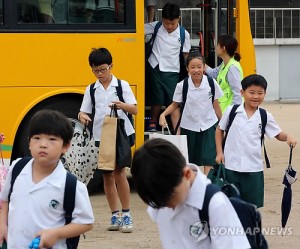- California Assembly OKs highest minimum wage in nation
- S. Korea unveils first graphic cigarette warnings
- US joins with South Korea, Japan in bid to deter North Korea
- LPGA golfer Chun In-gee finally back in action
- S. Korea won’t be top seed in final World Cup qualification round
- US men’s soccer misses 2nd straight Olympics
- US back on track in qualifying with 4-0 win over Guatemala
- High-intensity workout injuries spawn cottage industry
- CDC expands range of Zika mosquitoes into parts of Northeast
- Who knew? ‘The Walking Dead’ is helping families connect
In S. Korea, kindergarten admissions as competitive as college
By Chung Ah-young
Competition for gaining admission to kindergartens in South Korea is getting fiercer and in some ways as competitive as the country’s notorious college admissions process.
The race for next year’s kindergarten admissions is expected to be more cutthroat than ever before, as parents with children aged three to five are turning their eyes from daycare centers toward kindergartens and preschools amid the ongoing dispute between the government and regional educational offices over the budget for free preschool programs at daycare centers.
Under the current system, preschools accept children through a lottery of applicants.
While many parents want public kindergartens where tuition is lower and teacher quality is guaranteed, the number of public preschools is only enough for about 10% of all eligible children.
For private kindergartens as well, competition is high as parents want to send children to preschools with a good reputation. Also, out of fear of not winning the lottery for any preschools at all, parents apply at multiple kindergartens, thus pushing up the competition rates.
Kim Si-kyung, 38, living in Gyeonggi Province, said she applied at four kindergartens for her three-year-old daughter, but she failed to win the lottery in three and is waiting for the last one.
“I have been looking for kindergartens with good facilities and affordable tuition. But the chances are very low. If my daughter fails to win admission into the last one, I will send her to a cram school called English Kindergarten despite the high tuition,” she said.
To ease competition, educational offices have changed admission policies every year, with none being effective. This year, they allow applications without limits.
“We are receiving an increasing number of calls from parents seeking admission compared to last year. Maybe they have been influenced by the possible budget withdrawal at daycare centers,” an official of a kindergarten in Seoul said.
While the central government pushes the regional offices to take responsibility for funding free childcare services at daycare centers, the latter say daycare centers are governed by the Ministry of Health and Welfare and thus did not allocate a budget for the centers, adding they lack money. Only three out of 17 city and provincial education offices nationwide have set aside budgets for free daycare center programs.
They said the free program was one of President Park Geun-hye’s election promises and thus the central government should take responsibility.
“It is nonsense for the government to vow to boost the low birthrate on one hand, while it is worsening the situation by not funding childcare services on the other hand,” said the mother of a three-year-old daughter.
“The government only encourages parents to have a child without actions to support them. After giving birth to a baby, what comes next? It’s pathetic. That’s why many young women don’t want to have a baby,” she said.
In a bid to prevent the heated competition, the Seoul Metropolitan Council is seeking to revise a related ordinance allowing private kindergartens to charge application fees ― a measure scrapped in 2012.
But the news only angered parents further, as parents say that it will only aggravate their burden.













![일본 사도광산 [서경덕 교수 제공. 재판매 및 DB 금지]](http://www.koreatimesus.com/wp-content/uploads/2024/07/PYH2024072610800050400_P4-copy-120x134.jpg)



Pingback: Admission Into University In Denmark | types - top10 universities